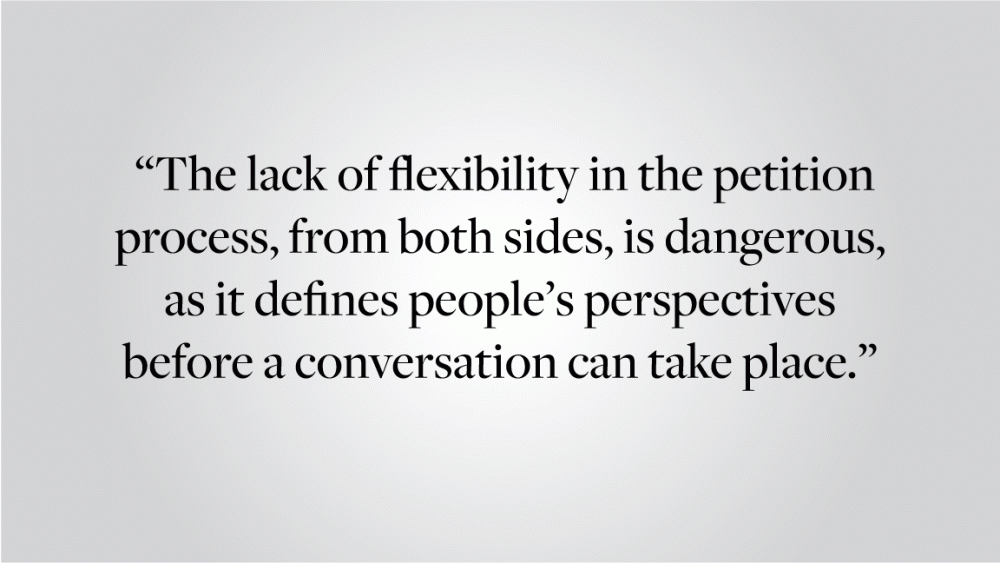In a campus-wide email sent on March 30, Dean of the College Rashid Zia ’01 officially denied the adoption of a Universal Pass system at Brown, which has gained substantial momentum among students. A great deal of this momentum comes from the Undergraduate Council of Students Executive Board’s endorsement of the policy, a result of a two-thirds voting majority among 12 people. UCS communicated the endorsement in a March 27 campus-wide email, encouraging students to sign the petition. During that March 26 meeting, the executive board rejected a proposal to send an opinion poll to collect students’ views both for and against Universal Pass, according to a March 26 letter sent from current UCS Treasurer and UCS Vice President-Elect Summer Dai ’22 to UCS leadership, which was reviewed by The Herald. While acknowledging the legitimacy of the endorsement, many of my peers and I were frustrated by the lack of a channel to express opposing voices before UCS’s announcement.
In response to this issue, I created a Facebook platform titled “No Universal Pass at Brown: Choice Matters” along with a petition to oppose the grading policy. I created the page to unite voices opposing a blanket policy of Universal Pass, and many signatories of my petition wrote explanations of their concerns. Universal Pass claims to help marginalized students by removing academic pressure from their shoulders. However, many testimonies in the petition against Universal Pass were from students who self-identify as marginalized, and they specified that their interests could be hurt by the policy. Dean Zia also recognized this fact in his email and mentioned students who had experienced extenuating circumstances in the past that impacted their academic performance. By instituting a Universal Pass policy, these marginalized individuals will lose the opportunity to showcase their strength and resilience over time.
After the University decided against Universal Pass, the logical next step for UP proponents would be to send a compromised solution plan that is more likely to be accepted by the administration. Personally, after reading Dean Zia's email, I felt the need to send him a series of policy proposals that addressed concerns from Universal Pass advocates while not compromising choice. However, everyone who signed my original petition expressed unequivocal opposition to Universal Pass. Representation requires full consent at all times. I could not send my updated policy proposal through a coalition approach without launching a second petition, which I thought would be too time-consuming and may not be successful. So I sent my ideas without signatories.
After I sent my proposal, I noticed a crucial issue. Just as I might not maintain a support base after shifting to a more nuanced proposal, Universal Pass supporters who signed the original UP petition may not want to change their view. Should they shift their policy in response to the University’s recent decision, they might lose the momentum they accumulated. As Universal Pass has already gained over 2,500 signatories, altering their proposal could be highly costly.
The lack of flexibility in the petition process, from both sides, is dangerous, as it defines people’s perspectives before a conversation can take place. Without open conversation, people feel they have to take their opinions to anonymous forums like Dear Blueno. The conversation there often produces controversy, and I was shocked to see outrage against students who are planning on going to medical school and are still hoping to get letter grades. From there, since the author cannot respond to the comments under their anonymous posts without disclosing their identity, the conversation stops because there can be no rebuttal.
If people take hard-line approaches without wanting to waive towards the middle, they won’t generate the best solutions. What should have been a conversation turned into bashing and manipulation.
I am convinced that we are better than this. Polarization coupled with highly emotional discourse, without a spectrum of ideas and willingness to compromise, does more harm than good. Future student initiatives should embody a more dynamic structure, allowing for a plurality of ideas and suggestions that will result in a more balanced, representational and actionable proposal to the administration.
The responsibility for gathering a plurality of voices should have been taken up by the student government. While the UCS email endorsement cited peer schools that adopted a mandatory Pass/Fail policy and asked the Brown community to “follow their lead” and push it “one step further” through embracing Universal Pass, it failed to acknowledge the individuality of each institution and the students in their communities. Our student government can and should do better.
On April 8, the Duke University Student Government Senate presented the results from a comprehensive survey that gathered 3,230 unique responses, representing 49.00 percent of the student body on the grading debate. They then used those survey results to make a recommendation to their administration. Had UCS not rejected the proposal for a census to gather public opinion before endorsing Universal Pass, we, the students, could have achieved something like this.
While it is challenging for a petition like Universal Pass to represent a variety of perspectives, UCS is in a position that can rectify this asymmetry. Even with the best of intentions, a board of 12 individuals should not decide on a narrative for the whole undergraduate population it represents. In the case of Universal Pass, without gathering the voices of marginalized students who oppose the initiative, its premise of equitability could not be fully justified. I hope, after this whole debate, UCS will learn its lesson and the newly elected officers will not make the same mistakes.
And I know for myself, I will not be creating a petition like I did, that drives a single narrative. I hope others will follow.
Michael Chen ’22 can be reached at michael_chen4@brown.edu. Please send responses to this opinion to letters@browndailyherald.com and op-eds to opinions@browndailyherald.com.

ADVERTISEMENT


